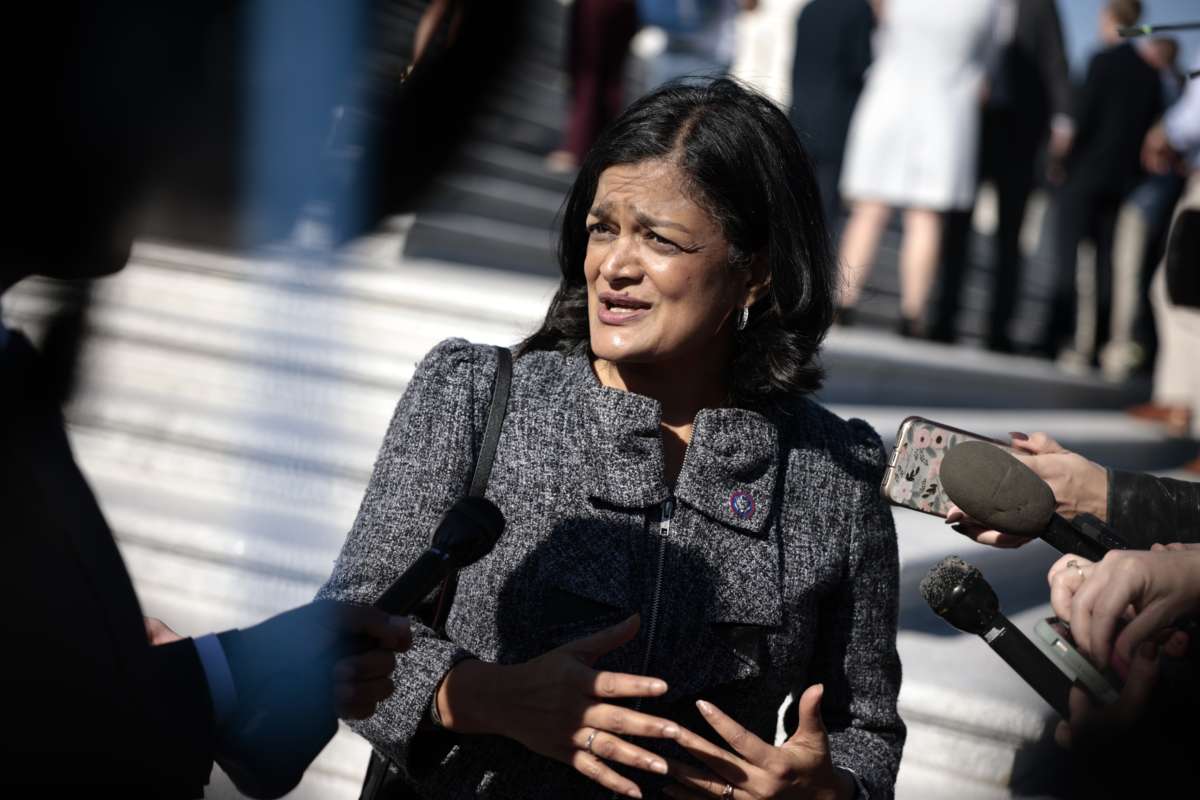Dozens of progressive lawmakers in the United States and Japan are urging President Joe Biden to make a “sensible” shift and commit the U.S. to a policy of no-first-use of nuclear weapons “at any time or under any circumstances.”
The demand, which is also directed at Japanese Prime Minister Fumio Kishida, came in a letter dated Friday.
The effort was led by lawmakers including Congressional Progressive Caucus chair U.S. Rep. Pramila Jayapal (D-Wash.) and U.S. Sen. Bernie Sanders (I-Vt.) as well as Progressive Caucus of Japan chair and Diet House of Representatives member Masaharu Nakagawa.
The group’s call comes as Russia’s ongoing invasion of Ukraine has escalated fears of atomic warfare, especially as Russian President Vladimir Putin has waved a “nuclear saber” with recent declarations.
Biden last month signed off on his administration’s Nuclear Posture Review, a policy which, to the disappointment of nonproliferation advocates, walks back his 2020 campaign promise of no-first-use. The NPR, according to U.S. officials, instead leaves open the possible use of nuclear weapons in response to non-nuclear warfare.
But, the lawmakers stressed in their letter, “it is never too late to commit to a no-first-use policy.”
Addressing the “nuclear umbrella” security alliance between the two nations, the letter states: “A no-first-use policy would not weaken the U.S. ability to protect Japan and itself from a nuclear attack. That protection is based on the promise of U.S. nuclear retaliation, not on the ability to strike first. In fact, a no-first-use policy would increase protection against a nuclear attack by reducing doubt, miscalculation, and the possibility of an accidental nuclear launch.”
Additionally, “a U.S. declaration stating that it would never start a nuclear war, supported by Japan, would breathe new life into international efforts to reduce and eventually eliminate the danger of nuclear war,” the lawmakers assert. “This is especially important at a time when tensions between the nuclear-weapons-possessing states, especially between the United States and China, are increasing.”
As The Associated Press reported Saturday, Russia’s attack on Ukraine has added new fears of a nuclear exchange.
“For U.S. officials and world leaders, discussions of how to respond to a limited nuclear attack are no longer theoretical,” AP reported.
“One overarching concern is that by casting some nuclear weapons as tactical weapons to be used in battle, Russia could break the nearly eight-decade global taboo against using a nuclear weapon against another country.” Yet, AP added, “even comparatively small tactical nuclear weapons approach the strength of the atomic bomb the United States dropped on Hiroshima, Japan, in World War II.”
The demand to the U.S. and Japanese leaders came a week after 16 Nobel Peace Prize winners released an open letter calling for an immediate end to the assault of Ukraine and the total elimination of nuclear weapons.
“The time to ban and eliminate nuclear weapons is now. It is the only way to guarantee that the inhabitants of the planet will be safe from this existential threat,” they wrote.
“It is either the end of nuclear weapons,” they said, “or the end of us.”
Join us in defending the truth before it’s too late
The future of independent journalism is uncertain, and the consequences of losing it are too grave to ignore. To ensure Truthout remains safe, strong, and free, we need to raise $29,000 in the next 36 hours. Every dollar raised goes directly toward the costs of producing news you can trust.
Please give what you can — because by supporting us with a tax-deductible donation, you’re not just preserving a source of news, you’re helping to safeguard what’s left of our democracy.
